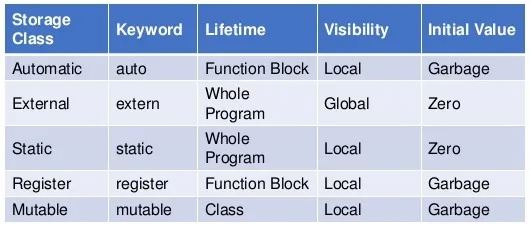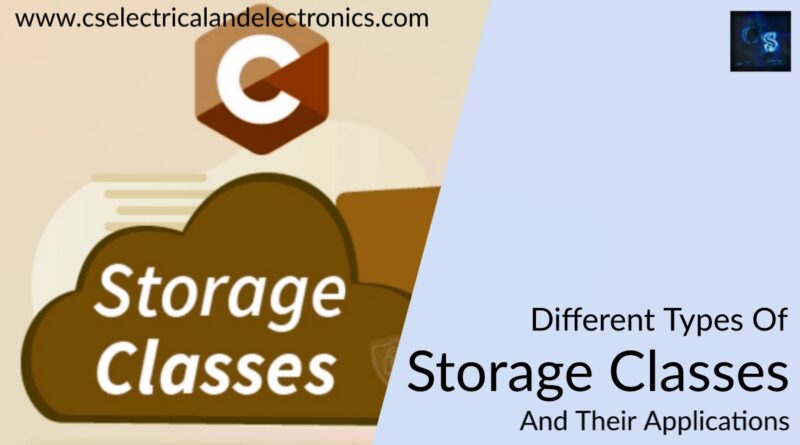Different Types Of Storage Classes, And Their Applications
Hello guys, welcome back to my blog. In this article, I will discuss the different types of storage classes, applications of storage classes, why it is needed, and I will provide an explanation on all the storage classes.
If you have any doubts related to electrical, electronics, and computer science, then ask questions. You can also catch me on Instagram – CS Electrical & Electronics And Chetan Shidling.
Also, read:
- Top 14 Data Structure Algorithm Applications In Real World
- Top 12 Data Science Companies In The World In 2022, Data Analytics
- Top 10 ML, AI Startups In The World, Artificial Intelligence Companies
Different Types Of Storage Classes
Storage Classes are basically used to describe the features of a function or a variable. The features described by the Storage Classes include scope and visibility. It also has a life that helps us to trace the existence of a particular variable during the runtime of the program. It uses used for defining the scope i.e. the visibility and the lifetime of the variables and functions of any kind of Programming language like C.
The Storage class is used in the description of the location where the variable will be stored. It is used in the place of the initialization of the value of a variable. It also defines a limit about who can access a particular variable. The different types of Storage Classes and their uses are as follows:

01. Auto: The auto storage class is basically a kind of default for variables. The variables are declared inside a block. For example, A variable named x that has automatic storage is deleted as soon as block X is declared as the existing box. Anyone can only apply the auto storage class specifier to names of variables declared in a block or to names of function parameters. It is a type of default storage class for all the variables declared inside a function or a block. The Auto keyword is rarely used while writing any kind of program in the C language.
These variables can be only accessed within the block/function they have been declared and not outside them which defines their scope. All these can be accessed within nested blocks within the parent block/function in which the auto variable was declared. They can also be accessed outside their scope by using the concept of pointers. The concept of the pointer is given here by pointing to the very exact memory location where the variables reside.
02. Extern: The main use of the extern storage class is to give a reference of a global variable that is visible to all the program files. While one uses the ‘extern’, the variable cannot be initialized. The Extern storage class points the variable name at a storage location that has been previously defined. If we have multiple files and we define a global variable or function, which will also be used in other files, then an extern will be used in another file to provide the reference of the defined variable or function.
For the sake of understanding, we can say that extern is used to declare a global variable or function in another file. The modifier of the extern storage class is most commonly used when there are two or more files sharing the same global variables or functions. The Extern storage class tells that the variable is defined elsewhere and not within the same block where it is used. In the extern storage class, the value is assigned to it in a different block and this can be overwritten/changed in a different block as well. An extern variable is basically a global variable initialized with a legal value where it is declared in order to be used elsewhere. This storage class can be accessed within any function/block.
03. Static: The static storage class plays a vital role in programming. It gives the instruction to the compiler to keep a local variable in existence during the lifetime of the program. It does not focus on creating and destroying local variables each time it comes into and goes out of scope. Therefore, making local variables static allows users to maintain their values between function calls. The static modifier can also be applied to global variables. When this process takes place it causes that variable’s scope to be restricted to the file in which it is declared.
Especially in the C programming, when static is used on a global variable, it causes only one copy of that member to be shared by all the objects of its class. The main use of the static storage class is to declare static variables. It is popularly used while writing programs in the C language. The main property of the static storage class is of preserving their value even after they are out of their scope. Therefore, we can say that the static variables preserve the value of their last use in their scope. Thus, we can say that they are initialized only once and exist till the termination of the program.
04. Register: The main use of the Register Storage is to define local variables that should be stored in a register instead of RAM. This refers to the fact that the variable has a maximum size equal to the register size usually one word and can’t have the unary ‘&’ operator applied to it as it does not have a memory location.
This type of storage class is used for variables that require quick access such as counters. It should be kept in mind that ‘register’ does not mean that the variable will be stored in a register. The main meaning of the register storage class is that it MIGHT be stored in a register depending on hardware and implementation restrictions.
Register variables are declared by the register storage class that has the same functionality as that of the auto variables. The only main basic difference is that the compiler tries to store register variables in the register of the microprocessor if a free registration is available. This process makes the use of register variables to be much faster than that of the variables stored in the memory during the runtime of the program.
This was about “Different Types Of Storage Classes“. I hope this article may help you all a lot. Thank you for reading.
Also, read:
- Cybersecurity Trends And Challenges In The Digital Age
- Natural Language Processing (NLP) In Computer Science
- Data Science In Action: Real-World Applications
- Software Testing Strategies: Ensuring Quality In Development
- The Evolution of Programming Languages
- Mobile App Development Trends In 2024
- Trends In Frontend Development: Frameworks And Libraries
- Continuous Integration And Continuous Deployment (CI/CD) Pipelines
Author Profile
- Chetu
- Interest's ~ Engineering | Entrepreneurship | Politics | History | Travelling | Content Writing | Technology | Cooking
Latest entries
 All PostsApril 29, 2024Top 11 Free Courses On Battery For Engineers With Documents
All PostsApril 29, 2024Top 11 Free Courses On Battery For Engineers With Documents All PostsApril 19, 2024What Is Vector CANoe Tool, Why It Is Used In The Automotive Industry
All PostsApril 19, 2024What Is Vector CANoe Tool, Why It Is Used In The Automotive Industry All PostsApril 13, 2024What Is TCM, Transmission Control Module, Working, Purpose,
All PostsApril 13, 2024What Is TCM, Transmission Control Module, Working, Purpose, All PostsApril 12, 2024Top 100 HiL hardware in loop Interview Questions With Answers For Engineers
All PostsApril 12, 2024Top 100 HiL hardware in loop Interview Questions With Answers For Engineers








